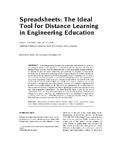Please use this identifier to cite or link to this item:
http://hdl.handle.net/10311/603Full metadata record
| DC Field | Value | Language |
|---|---|---|
| dc.contributor.author | Kanyarusoke, K.E. | - |
| dc.contributor.author | Uziak, J. | - |
| dc.date.accessioned | 2010-09-29T13:39:12Z | - |
| dc.date.available | 2010-09-29T13:39:12Z | - |
| dc.date.issued | 2009 | - |
| dc.identifier.citation | Kanyarusoke, K.E. & Uziak, J. (2009) Spreadsheets: the ideal tool for distance learning in Engineering education, Computer Applications in Engineering Education, Vol. 17, No. 4, pp. 363-483 | en_US |
| dc.identifier.issn | 1099-0542 (Online) | - |
| dc.identifier.issn | 1061-3773 (Print) | - |
| dc.identifier.uri | http://hdl.handle.net/10311/603 | - |
| dc.description.abstract | Formal Engineering Education has traditionally been delivered using the low technology—high touch lecturing method, in which the lecturer and student meet face to face. Distance education in this field has been quite slow to develop primarily because of difficulty in delivery of practical based instructions and problems on integrity of assessments. Developments in information technology and the increased demand for further education by people already in employment have however changed this even in developing countries. It puts extra demand on Lecturers to guide distance learners in handling numerical computations so prevalent in Engineering. At the campuses, computer based methods are available in the high touch—high tech lecture method. High level and efficient computer software is used to help the student to simulate and solve some problems. However, such software is expensive—and therefore—not readily available to the distant learner. Spreadsheets on the other hand are almost universal on today’s computers and they bridge the gap between hand calculations and high level programme computations. This paper therefore makes a case for the use of spreadsheets in Distance Engineering Education. An example in Spring Design, Selection and Adaptation is used to illustrate the simplification and other advantages of their use by practicing distance learners. | en_US |
| dc.language.iso | en | en_US |
| dc.publisher | Wiley Periodicals Inc. http://onlinelibrary.wiley.com/journal/10.1002/(ISSN)1099-0542 | en_US |
| dc.subject | Spreadsheets | en_US |
| dc.subject | Practicing distance learner | en_US |
| dc.subject | Digital divide | en_US |
| dc.subject | Compression spring static design | en_US |
| dc.subject | Component reverse engineering | en_US |
| dc.subject | University-industry cooperation | en_US |
| dc.title | Spreadsheets: the ideal tool for distance learning in Engineering education | en_US |
| dc.type | Published Article | en_US |
| dc.link | http://onlinelibrary.wiley.com/doi/10.1002/cae.20235/pdf | en_US |
| Appears in Collections: | Research articles (Dept of Mechanical Engineering) | |
Files in This Item:
| File | Description | Size | Format | |
|---|---|---|---|---|
| Kanyarusoke_CAEE_2009.pdf | 1.01 MB | Adobe PDF |  View/Open |
Items in DSpace are protected by copyright, with all rights reserved, unless otherwise indicated.
